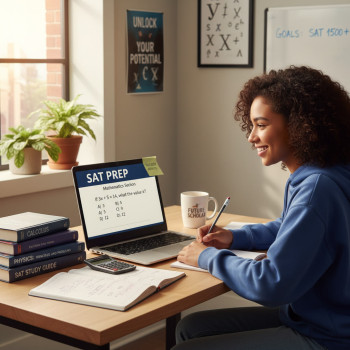Why Small Wins Matter More Than You Think
When you’re deep in the grind of Digital SAT preparation, it’s easy to make all-or-nothing judgments: one practice test feels perfect or it feels like a catastrophe. But a steady stream of small, intentional celebrations—recognizing the progress you actually make—changes everything. Small wins are the sparks that keep motivation burning. They build confidence, reduce burnout, and create a rhythm that turns busy effort into meaningful progress.

How Parents and Students Can Reframe “Success”
Parents: your role isn’t just to cheer the big score. It’s to help notice the small, measurable improvements that add up—faster reading speed on practice sections, fewer careless mistakes in algebra problems, or a two-day streak on a study plan. Students: give yourself permission to measure success in steps, not only in final scores. Celebrate habits, process improvements, and emotional resilience.
Examples of Meaningful Small Wins
- Completing a timed Reading section without panicking, even if the score isn’t perfect.
- Reducing silly arithmetic mistakes from one practice week to the next.
- Sticking to a study schedule for seven days in a row.
- Asking a tutor for clarification when you’re stuck—practice in vulnerability.
- Finding a faster way to annotate digital passages or use the built-in calculator more effectively.
- Turning in a college list draft after months of procrastination.
Designing Small-Win Goals That Actually Work
To get the most out of celebrating wins, you want specific, measurable, and short-term goals. These are the building blocks of momentum.
SMART Mini-Goals for SAT Prep
- Specific: “Finish two Reading practice passages and annotate them in 40 minutes total.”
- Measurable: “Lower careless errors in algebra by 50% in three weeks.”
- Achievable: “Complete 20 minutes of vocabulary practice five days this week.”
- Relevant: “Work on math problem types that show up often on Digital SAT (algebraic structure, problem solving).”
- Timed: “Take one timed practice section every Saturday morning for a month.”
Micro-Habits to Track
Micro-habits are tiny actions that you can repeat daily to scaffold improvement:
- Highlight one useful tactic after each practice section.
- Write down three errors you won’t repeat next time.
- Spend five minutes reviewing formula sheets before bed.
- Teach one concept to a family member—teaching is learning.
Creative Ways to Celebrate—Without Losing Focus
Celebrations don’t need to be big parties. The trick is to make rewards meaningful, immediate, and proportional to the goal.
Low-Key, High-Impact Celebrations
- Sticker or token on a visible calendar for each study streak day.
- “Win jar” where you drop a note describing a small win; read them before the test.
- A special playlist that plays only after a successful practice session.
- Debt-free time: 30 minutes guilt-free screen time as a reward for hitting a goal.
- Mini-moose treats: a favorite snack or a brief bike ride to break up study blocks.
Celebration Ideas That Build Skills
Choose rewards that also reinforce study habits:
- Swap a tutoring session for a game-based review with your tutor—fun and formative.
- Upgrade your study toolkit (new notebook, stylus for Bluebook practice) after three consistent weeks.
- Have a parent-student reflection dinner to talk about progress, not just scores.
Use Data Smartly: Track Progress Without Obsession
Data and practice tests are useful, but they’re tools—not verdicts. The Digital SAT comes with different pacing and question styles; use practice results to pinpoint what to celebrate and what to change.
Simple Progress Table to Track Small Wins
| Week | Mini-Goal | Metric | Win? | Next Mini-Goal |
|---|---|---|---|---|
| 1 | 3 timed Reading items/day | Avg time per item | Yes (improved by 10s) | Increase to 5 items/day |
| 2 | Algebra practice set | Careless error rate | Partial (down 25%) | Target specific mistake types |
| 3 | Full timed section | Score range vs. baseline | No (learned pacing) | Practice pacing strategies |
This kind of table keeps celebrations tied to real learning—so wins still feel earned, and ‘misses’ become experiments rather than failures.
Turn Mistakes Into Mini-Wins
One of the most powerful reframes is to treat mistakes as data. Each error you correct is a win because it narrows the scope of what you need to learn. When you track mistakes intentionally, you’ll notice patterns faster and celebrate the moment when a recurring error disappears.
How to Make a “Fix It” Win
- Record the mistake type (e.g., misreading comma clauses, sign errors).
- Write the correction in one sentence—what you’ll do next time.
- Practice two problems that use the same concept within 24–48 hours.
- Mark the mistake as resolved when it doesn’t reappear in the next seven practice items.
Rituals That Reinforce Positive Momentum
Rituals build identity: you start to see yourself as “someone who prepares thoughtfully for the SAT.” Rituals are small and repeatable and can include student-parent rituals that improve communication about progress.
Daily and Weekly Ritual Examples
- Daily: Three-minute review after each study block—note one thing learned and one question left unresolved.
- Weekly: Sunday 20-minute check-in—review the progress table, set micro-goals for the week, and celebrate the top two wins.
- Monthly: Mock test followed by a relaxed debrief dinner—celebrate the effort, not the result.
How Tutors and Personalized Support Amplify Small Wins
A great tutor doesn’t just teach content—they translate progress into momentum. Personalized tutoring amplifies small wins in three ways: focused feedback, tailored practice tasks, and emotional support. For example, Sparkl’s personalized tutoring provides 1-on-1 guidance and tailored study plans, helping students identify the exact micro-skills to celebrate and iterate on. The tutors’ targeted feedback makes each corrected mistake and shorter pacing time feel like a meaningful step forward.
What to Expect from Personalized Tutoring
- Individual skill diagnostics that reveal the highest-leverage areas for small improvements.
- Tailored practice that focuses on the specific question types you’re missing frequently.
- Motivational check-ins that turn routine progress into noticeable momentum.
Celebrate as a Family: Keeping Pressure Healthy
Parents can help keep celebrations proportionate and genuine. Avoid turning rewards into bargaining chips for future work. Instead, use celebrations to highlight progress in habits, to validate effort, and to normalize the ups and downs of studying.
Healthy Family Celebration Tips
- Use neutral language: “I noticed you practiced every day this week—that’s a big step.”
- Make celebration communal—share a family meal after a practice test instead of focusing solely on the score.
- Encourage autonomy—let the student choose a reward once they meet a goal.
- Keep comparisons away—celebrate improvement relative to the student’s own baseline.
When to Celebrate Big—and How to Keep Momentum After
Big celebrations are for milestones: a practice-test score that surpasses a target, a significant jump in a specific skill area, or finishing a comprehensive study plan. When a big win happens, mark it thoughtfully and then immediately set the next small goal so momentum continues.
Big Win Playbook
- Pause and reflect: write what worked and why.
- Reward proportionally: pick a meaningful but sustainable reward (trip to a museum, favorite meal).
- Plan forward: identify the next micro-goal to prevent letting the momentum fade.
Practical Tools to Make Celebrations Automatic
Tools can take the friction out of celebrating. Use a mix of digital and analog systems—calendars, habit apps, simple spreadsheets, or the notes app on your phone. Whatever you pick, keep it easy to use and visible. The more effortless the celebration, the more often it happens.
Tool Ideas
- Visible Progress Board: whiteboard with daily stickers and weekly summaries.
- Win Jar: physical jar or digital folder where small wins are deposited.
- Simple Tracker: a one-line spreadsheet logging goal, metric, and whether the win was reached.
- Tutor Feedback Loop: ask your tutor for one “top win” and one focus area after each session—Sparkl tutors often provide this kind of targeted summary to keep progress actionable.
Real Student Stories (Composite, Yet Familiar)
Hannah used to obsess over full-length practice test scores. Her tutor suggested she celebrate micro-wins instead: improving her passage-skimming speed by 15 seconds and reducing math careless errors from seven to three per section. Over three months, those small changes compounded—her full-test score increased, but more importantly, Hannah felt calmer and more in control.
Marcus didn’t like to study in the evenings. He committed to a 20-minute morning routine: two vocab cards and one math problem. Seeing a streak of green checkmarks on his calendar was energizing; his family began to celebrate his streak at dinner each Sunday. Those tiny, repeatable moments built the stamina he needed for longer sessions later in his prep.
Handling Plateaus: When Small Wins Slow Down
Plateaus are normal. When progress slows, scale back goals so you can achieve them again—then rebuild. Plateaus are often a sign you need to switch tactics: change practice materials, shift your study time, or work with a tutor to attack a stubborn concept from a new angle.
Plateau-Breaking Checklist
- Re-evaluate goals—are they still realistic?
- Change your practice format—try timed micro-tests instead of long sections.
- Focus on quality: fewer, deeper practice problems beat many shallow ones.
- Celebrate consistency rather than outcome—three consistent hours of study this week is still a win.
Final Thoughts: Make Celebration a Habit, Not an Event
The Digital SAT is one stop on the journey to college—but the habits you build while preparing will carry you much further. Celebrate early and often. Turn small improvements into rituals. Use data to inform your pride rather than to punish yourself. And remember: every corrected mistake and every consistent study session is a victory worth honoring.
If you want guided help turning small wins into sustained momentum, consider exploring personalized options like Sparkl’s tutoring—1-on-1 guidance, tailored study plans, and AI-driven insights can help you identify the most meaningful micro-goals and celebrate them in ways that actually improve scores and wellbeing. The right support doesn’t replace effort—it magnifies it.

Quick Checklist: Start Celebrating Today
- Pick one micro-goal you can complete this week.
- Create a visible way to mark wins—a calendar, jar, or app.
- Plan a small, meaningful reward that reinforces study habit.
- Share your win with a tutor or parent for accountability and encouragement.
- Document one lesson learned from each mistake and celebrate when it stops recurring.
Small wins are the secret engine of big improvement. Celebrate them honestly, often, and in ways that foster learning. Over time, those sparks add up to lasting confidence and a stronger performance on test day and beyond.
Parting Encouragement
Remember: a single practice test score doesn’t define you. The habits, persistence, and emotional resilience you build in preparation will. Celebrate the steps that lead you there.











No Comments
Leave a comment Cancel